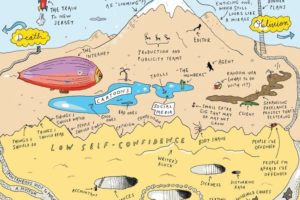I recently read an article by Leonard Cassuto on career diversity, and how David Porter, an English professor at the University of Michigan teaches a graduate seminar on helping students look at other job opportunities outside of teaching positions and academia. This article gives me hope as it shows how colleges and universities are finding creative ways to help graduate students look outside of academia for jobs, especially during a time of limited professorships. I’m encouraged by this professor in the way he steps out of his comfort zone and his own expertise and experience for the benefit of helping his students think outside the box. While traditionally getting a Ph.D. meant you were on the track to a career in academia in a teaching position, there are so many other opportunities to utilize a doctoral degree and graduate students need to be aware of these opportunities. Since doctoral students spend their blood, sweat, and tears, not to mention all of the resources of their time, finances, and energy, they need to be able to see the broader opportunities available to them if a career in teaching does not pan out. In this way, they can be more prepared for their futures, as they can find viable options for career opportunities.
In my own experience, I have seen the benefits of bridging the things I was learning in my doctoral program to my actual workplace. While I do work at a university, my current work in procurement is more business-oriented than it is academic. This past summer, I took an independent study course on assessment and reflective practice. Although the course focused on higher education and ministry settings, I found that the assessment principles that I learned proved to be valuable and applicable in my current work in procurement. I was able to apply the things that I learned about assessment in a project proposal for my workplace to improve trainings for users as we implement a new travel and expense system. In this way, I found how assessment was very useful and I was able to find meaning in the things I was learning.
To be honest, I have become more aware that I do not want to be a professor as I progress in my graduate studies. At times, it has been challenging to engage in a doctoral program, which sometimes feels inapplicable to my current work or future aspirations. This disconnect has made me question my purpose in getting a doctorate and wonder what I am doing in the program. However, as I see more ways to connect the things that I am learning in my coursework to my workplace, I find my studies and work more meaningful and find motivation to continue in my studies. As I see how other people are also looking at ways to branch out of academia and utilize their doctoral degrees in a variety of ways, I am encouraged to know that my education can be useful in a variety of areas, and that I do not have to follow the traditional path of becoming a professor.
When Ph.D. graduates find ways to use their education and training outside of academia, it is a win for both the academia and the industry as graduates show the value that each bring to each other. Bridging the gap between theory and practice, doctoral graduates can utilize their research skills to help companies and organizations make more informed decisions that can bring more revenue, increased efficiency, and connections with others. In this way, academics can climb down from their ivory towers, learn from others, and practically apply the things they have learned through their research in a variety of contexts.





Leave a Reply
Your email is safe with us.